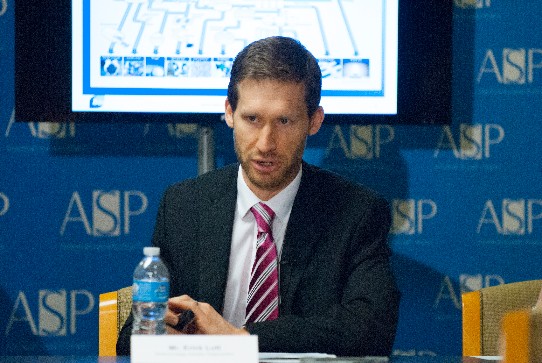
Event Recap: Renewable Transportation – Policy Options to Break the Oil Monopoly
Podcast: Play in new window | Download
Subscribe: Apple Podcasts | RSS
For nearly a decade, policymakers have attempted to more effectively incentivize the development of sustainable alternatives to petroleum as a transportation fuel. Mandates, subsidies, and other policies have succeeded in replacing 10% of the fuel supply with ethanol grown in the U.S. and have begun to create a network of battery-operated vehicles. But, these efforts are as yet incomplete, with further policy advances being hampered by the domestic boom in oil.
American Security Project hosted a panel of industry experts to speak about the current environment for renewable transportation and how their companies are leading innovation in developing different solutions to this serious problem. Erick Lutt, Director for Policy for the Biotechnology Industry Organization’s (BIO) Industrial and Environmental Section (IES), Ken Hill, Biofuels Business Development and Licensing Leader at DuPont Biofuels, James Chen, Vice President of Regulatory Affairs at Tesla, and Dr. Amgad Elgowainy, Principal Energy Systems Analyst and the Life-Cycle Analysis Team Lead at Argonne National Laboratory were panelists. Julia Pyper, a reporter for E&E Publishing, moderated the discussion with the observation that fuel is currently comprised of 10% renewable substances. This coupled with a growing demand for plug in vehicles showws that the industry is progressing.
Lutt outlined current trends in the government and areas that need further attention to merit success in the future. He stated that success
…is done through government incentives and the number of policy instruments. This in turn creates a favorable climate for innovation and continued investment. These tax incentives have provided to drive down the cost of future technologies.
He expressed concerns about the EPA’s recent reduction of volume of renewable fuel dictated by the “Renewable Fuel Standard” stating “This shows a deep misunderstanding of the RFS.” This uncertain investment climate forces companies to take their companies and projects overseas. Many companies state that this is a direct result from the uncertain investment climate in the United States towards biofuels.
He outlined that “…the Obama administration must finalize their stance and fix the RFS to be based of the capabilities of production for bio fuels and not in regards to oil production.”
Hill outlined positive steps DuPont is taking in the field of biofuels and how there is a nexus between agriculture and bio technology. In his summary of current issues for biofuels he stated: “Corn ethanol was off the shelf technology when the RFS was first implemented. The real challenge is feeding the factory enough to produce a viable level of fuel.”
There is a substantial benefit to be had in rural economies across the nation. For ethanol to be produced, there will need to be a serious expansion in the production in energy crops, and this in turn will help generate funds in once displaced economies, as not all of the crops needed can be produced in the Midwest region.
While biofuels might pose part of the answer to this question, a group still needs to do research on their role in the environment. Dr. Elgowainy’s group at Argonne National Laboratory focuses on the assessment of alternative fuels and the impact they might have on the environment. His summarized his current research:
…our goal is to look at the manufacturing of energy. We analyze all the way from the primary source and energy type. What is used? What is the life cycle of the fuel? Are there any additional emissions that we need to take into account?
DuPont is not the only business making advances in the renewable transportation field, as Tesla proposes a different solution than biofuels. Chen outlined the different way people are approaching the dependence on petroleum, as he asserted that “half of our trade deficit is tied to oil”. With the reveal of their 2008 roadster, Telsa aimed at being a catalyst in the automotive industry to spur a change into an electric vehicle market. They key to a successful implementation to electric vehicles in the main stream consumers lies in innovation iteration, according to Chen.
Our aim is to increase production while driving down price. While at one point you paid $15,000 for a flat screen T.V., that is no longer the case due to constant innovation.
While the panelist all had their own methods to reduce our reliance on foreign petroleum and oil, they were in agreement that we are standing at a disadvantage if we do not modernize and adapt.






[…] Event Recap: Renewable Transportation – Policy Options to Break the Oil Monopoly […]
[…] Event Recap: Renewable Transportation – Policy Options to Break the Oil Monopoly […]